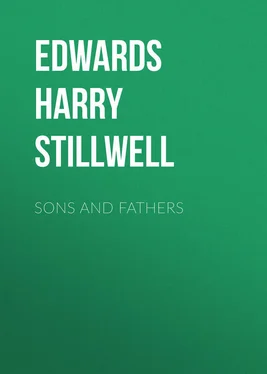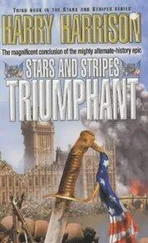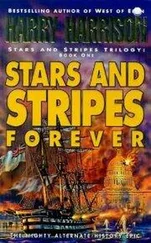Harry Edwards - Sons and Fathers
Здесь есть возможность читать онлайн «Harry Edwards - Sons and Fathers» — ознакомительный отрывок электронной книги совершенно бесплатно, а после прочтения отрывка купить полную версию. В некоторых случаях можно слушать аудио, скачать через торрент в формате fb2 и присутствует краткое содержание. Жанр: foreign_antique, foreign_prose, на английском языке. Описание произведения, (предисловие) а так же отзывы посетителей доступны на портале библиотеки ЛибКат.
- Название:Sons and Fathers
- Автор:
- Жанр:
- Год:неизвестен
- ISBN:нет данных
- Рейтинг книги:5 / 5. Голосов: 1
-
Избранное:Добавить в избранное
- Отзывы:
-
Ваша оценка:
- 100
- 1
- 2
- 3
- 4
- 5
Sons and Fathers: краткое содержание, описание и аннотация
Предлагаем к чтению аннотацию, описание, краткое содержание или предисловие (зависит от того, что написал сам автор книги «Sons and Fathers»). Если вы не нашли необходимую информацию о книге — напишите в комментариях, мы постараемся отыскать её.
Sons and Fathers — читать онлайн ознакомительный отрывок
Ниже представлен текст книги, разбитый по страницам. Система сохранения места последней прочитанной страницы, позволяет с удобством читать онлайн бесплатно книгу «Sons and Fathers», без необходимости каждый раз заново искать на чём Вы остановились. Поставьте закладку, и сможете в любой момент перейти на страницу, на которой закончили чтение.
Интервал:
Закладка:
One day she had died in this front room! What an agony of grief must have torn the boy left behind. In the dim light of the room he had opened, objects began to appear; almost reverently Edward raised a window and pushed open the shutters. Behind him stood ready for occupancy a snowy bed, with pillows and linen as fresh seemingly as if placed there at morn. By the bedside was a pair of small worn slippers, a rocking chair stood by the east window, and by the chair was a little sewing stand, with a boy's jacket lying near, and threaded needle thrust into its texture. On the little center table was a well-worn Bible by a small brass lamp, and a single painting hung upon the wall – that of a little farmhouse at the foot of a hill, with a girl in frock and poke bonnet swinging upon its gate.
There was no carpet on the floor; only two small rugs. It had been the home of a girl simply raised and grown to womanhood, and her simplicity had been repeated in her boy. The great house had been the design of her husband, but there in these two rooms mother and son found the charm of a bygone life, delighting in those "vague feelings" which science cannot fathom, but which simpler minds accept as the whispering of heredity.
One article only remained unexamined. It was a small picture in a frame that rested upon the mantel and in front of which was draped a velvet cloth. Morgan as in a dream drew aside the screen and saw the face of a wondrously beautiful girl, whose eyes rested pensively upon him. A low cry escaped the octoroon, who had noiselessly followed him; she was nodding her head and muttering, all unconscious of his presence. When she saw at length his face turned in wonder upon her she glided noiselessly from the room. He replaced the cloth, closed the window again and tiptoed out, locking the door behind him.
He found the octoroon downstairs upon the back steps. She was now calm and answered his questions clearly. She had not belonged to John Morgan, she said, but had always been a free woman. Her husband had been free, too, but had died early. She had come to keep house at Ilexhurst many years ago, before the war, and had been there always since, caring for everything while Mr. Morgan was in the army, and afterward; when he was away from time to time. No, she did not know anything of the girl in the picture; she had heard it said that he was once to have married a lady, but she married somebody else and that was the end of it. John Morgan had kept the room as it was. No, he was never married. He had no cousins or kinfolks that she had heard of except a sister who died, and her two sons had been killed in battle or lost at sea during the war. Neither of them was married; she was certain of that. She herself cooked and kept house, and Ben, a hired boy, attended to the rest and acted as butler.
Edward was recalled to the present by feeling her eyes fixed upon him. He caught but one fleeting glance at her face before it was averted; it had grown young, almost beautiful, and the eyes were moistened and tender and sad. He turned away abruptly.
"I will occupy an upper room to-night," he said, "and will send new furniture to-morrow." His baggage had come and he went back with the express to the city. He would return, he said, after supper.
Sometimes the mind, after a long strain imposed upon it, relieves itself by a refusal to consider. So with Edward Morgan's. That night he stood by his window and watched the lessening moon rise over the eastern hills. But he seemed to stand by a low picket fence beyond which a girl, with bare arms, was feeding poultry. He felt again the power of her frank, brown eyes as they rested upon him, and heard her voice, musical in the morning air, as it summoned her flock to breakfast.
In New York, Paris and Italy, and here there in other lands, were a few who called him friend; it would be better to wind up his affairs and go to them. It did not seem possible that he could endure this new life. Already the buoyancy of youth was gone! His ties were all abroad.
Thoughts of Paris connected him with a favorite air. He went to his baggage and unpacked an old violin, and sitting in the window, he played as a master hand had taught him and an innate genius impelled. It was Schubert's serenade, and as he played the room was no longer lonely; sympathy had brought him friends. It seemed to him that among them came a woman who laid her hand on his shoulder and smiled on him. Her face was hidden, but her touch was there, living and vibrant. On his cheek above the mellow instrument he felt his own tears begin to creep and then – silence. But as he stood calmer, looking down into the night, a movement in the shrubbery attracted him back to earth; he called aloud:
"Who is there?" A pause and the tall figure of the octoroon crossed the white walk.
"Rita," was the answer. "The gate was left open."
CHAPTER V
THE STRANGER IN THE LIBRARY
Edward was up early and abroad for exercise. Despite his gloom he had slept fairly well and had awakened but once. But that once! He could not rid himself of the memory of the little picture and it had served him a queer trick. He had simply found himself lying with open eyes and staring at the woman herself; it was the same face, but now anxious and harassed. He was not superstitious and this was clearly an illusion; he rubbed his eyes deliberately and looked again. The figure had disappeared. But the mind that entertains such fancies needs something – ozone and exercise, he thought; and so he covered the hills with his rapid pace and found himself an hour later in the city and with an appetite.
The day passed in the arrangement of those minor requirements when large estates descend to new owners. There was an accounting, an examination of records. Judge Eldridge gave him assistance everywhere, but there was no time for private and past histories. In passing he dropped in at Barksdale's office and left a card.
One of the distinctly marked features of the day was his meeting with a lawyer, Amos Royson by name. This man held a druggist's claim of several hundred dollars against the estate of John Morgan for articles purchased by Rita Morgan, the charges made upon verbal authority from the deceased. John Morgan had been absent many months just previous to his death and the account had not been presented.
Edward was surprised to find, upon entering this office, that the lawyer was the man who had collided with Montjoy's horse the night before. Royson saluted him coldly but politely and produced the account already sworn to and ready for filing. It had been withheld at Eldridge's request. As Edward ran his eye over the list he saw that chemicals had been bought at wholesale, and with them had been sent one or two expensive articles belonging to a chemical laboratory. Just what use Rita Morgan might have for such things he could not imagine. He was about to say that he would inquire into the account when he saw that Royson, with a sardonic smile upon his face, was watching him. He had a distinct impression that antipathy to the man was stirring within him; he was about to pay the account and rid himself of the necessity of any further dealings with the man, when, angered by the impudent, irritating manner, he decided otherwise.
"Have you ever shown this account to Rita Morgan?"
"Oh, yes!"
"And she pronounced it correct, I suppose?"
"She did not examine it; she said that you would pay it now that John Morgan is dead."
"If the account is a just charge upon the Morgan estate I certainly will," said Morgan, pocketing the written statement.
"I think after you examine into the matter it will be paid," said Royson, confidently. Edward thought long upon the man's manner and the circumstance, but could make nothing out of them. He would see Rita, and with that resolution he let the incident pass from his mind.
Читать дальшеИнтервал:
Закладка:
Похожие книги на «Sons and Fathers»
Представляем Вашему вниманию похожие книги на «Sons and Fathers» списком для выбора. Мы отобрали схожую по названию и смыслу литературу в надежде предоставить читателям больше вариантов отыскать новые, интересные, ещё непрочитанные произведения.
Обсуждение, отзывы о книге «Sons and Fathers» и просто собственные мнения читателей. Оставьте ваши комментарии, напишите, что Вы думаете о произведении, его смысле или главных героях. Укажите что конкретно понравилось, а что нет, и почему Вы так считаете.












